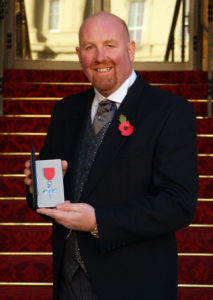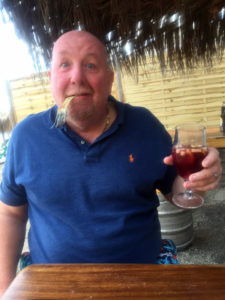The Interview: Karl Vella MBE

Vella Group executive chairman and Lancashire native Karl Vella, 60, shares some of the wisdom he has gleaned during his 40-plus years working in collision repair.
Tells us about your career.
I’ve always loved working with cars, so when I left school at 16 – without any qualifications I might add – I knew I wanted a job that involved motors. At age 18 I got my wish and found a job with my girlfriend’s uncle, who had a one-man band backstreet garage. I loved it, but I knew that what I really wanted was to be my own boss. That meant I could still do what I enjoyed but I might also get to own a really nice car instead of just working on someone else’s. When I was 26 I took a huge risk and started up on my own in a small lock-up, before I took another big risk and bought premises in Southport to start a proper bodyshop. That was the first Vella Group site, and it’s still going strong today. From there, we’ve grown at a steady pace, the second site being in my home town of Skelmersdale, which at the time was one of the largest repair centres in Europe. We now have sites in Chester, Deeside, Leominster, Preston and Workington, with our next site soon to open in Liverpool.
What did you want to be at school?
At school I was quite the entrepreneur – I used to buy snacks and drinks and sell them to other pupils at breaktime because the school didn’t have a tuckshop. But like most kids I didn’t have a clue what I wanted to do, I just wanted to work and earn money. I was supposed to go to work in my uncle’s joinery business as I used to help him in the school holidays, but that fell through. I do remember my first wage slip from a supermarket where I unloaded delivery wagons and stacked shelves was £13 11s 6d in old money (£13.60 in new).
What first inspired you to get into collision repair?
A turn of fate, really. I had a bump in my car and the car I ran into the back of went to be fixed at my girlfriend’s uncle’s bodyshop. I didn’t have any money to pay him the £200 it came to, but he said I could do labouring jobs to help pay it off. After a while I started helping with repairing cars and eventually I went to work for him full time. I was there for over four years and he taught me a lot of good things about doing the job right.
What is the best thing about the industry?
The people are the best thing. I’ve been lucky enough to meet some great people and become friends with many, sharing the ups and downs the industry has seen over the years. Plenty of us started to grow our businesses around the same time and it’s great to see how many of those early bodyshops have gone from strength to strength. The industry takes a fair knocking at times, but the people involved keep at it, working hard and providing a great service to customers.
What does it take to become a successful bodyshop owner?
That’s something that has changed over the years. When I first started it was hard work – sleeves up and get stuck in, knowing that your name was above the door and the quality of each job had that name on it. Times have changed; it’s not just about repairing cars anymore, and you just can’t stack up the car park to keep your technicians happy with their bonuses. Vehicle technology is always changing and you need to be on top of all the other commitments of running a modern business. What I’m really saying is that being a successful bodyshop owner means you have to be aware of what is changing around you and change with it. What’s also important is making sure you have a great team around you, especially if you want to grow. You need people that you know are going to give their all and love the business and industry (almost) as much as you do. It’s not an easy industry to work in so you’re looking for people who can get stuck in, but also people who have skills and experiences outside your own. I don’t know how the cloud works, and I don’t want to know how the cloud works, but I know I need someone who does. Some things like quality and customer care never change though, and they should always be something every customer expects and receives as part of business as usual.
What represents a typical day for you now?
A typical day? Do we have those in this industry? Joking aside, while I’m not as involved as I used to be, it’s hard to stay away from the business. However, I have a great team running things and these days my role is largely to advise and support where needed.
What is your idea of a perfect weekend?
I enjoy spending time with the family and meals out, especially a good curry. I still enjoy a good night out, perhaps a bit too often according to my wife. We love to travel and visit places we haven’t yet seen. I love my cars and have a fair few I’m working on at any one time. I still can’t resist a bargain and I still can’t resist an old banger that needs putting back together.
 Tell us about your WorldSkills involvement and the MBE?
Tell us about your WorldSkills involvement and the MBE?
When I started the business it was very hard to find skilled people, so from the start I invested in training apprentices and it has remained a focus for myself and the business ever since. It was really heartening to receive awards at the time; we knew it was right for the business and the wider recognition was really appreciated. It was from there that I started to get involved with the WorldSkills competition. I was initially asked, back in 1996, to find a suitable candidate under the age of 22 to represent the UK in the panel beating category, and our competitor won a Diploma of Excellence at the competition in St Gallen [Switzerland] in 1997. It was an amazing experience, and I remained the UK training manager for the next seven competitions, five of which I was also chief expert in Auto Body. It was a real privilege and I’ll happily admit that being involved with winning medals, including gold, in a tough environment like WorldSkills was great. In 2006, I was honoured to receive an MBE for my services to skills training, which was very humbling and a big surprise at the time (see picture). As milestones go, it was a real reminder just how far the 18-year-old me, eager to get a proper job working with cars, had come.
What was the first car you bought and what’s your everyday run-around today?
My first car was a metallic brown 10-year-old 1966 Ford Cortina MKII. It was a terrible example full of bumps and holes typical of the cars produced then – they used to rot very early. I paid £50 for it and because I was 17 the insurance was about five times that. My daily drive now is a 5 series BMW. I love driving my older cars – my 1990 Porsche 911 and my Mercedes 380 SL are both a delight. I recently bought a 1994 BMW 850 which I am just doing bits on to make it usable. I love having cars that I worked on when I started in business but couldn’t afford at the time.
Who’s your greatest hero?
I have lots of people I admire and respect and whom I have taken learnings from throughout my life. My dad worked hard and taught me the value of doing the right thing and to be popular and straight. My mum was kind and spoiled me rotten, but my uncle Roy Allerton, who was an engineer and bought me gyroscopes, Meccano and scientific toys, was the person I tried to please and earn his respect as he was always there to give me good advice when I started in business.
What accomplishment are you most proud of?
I have quite a few things that I am really proud and grateful for: my business and how it has grown and continues to grow; the team of people who work with me and who deliver my promise and passion; my involvement in skills training and the MBE I received; and the many, many friends I have met during my 40 years in the industry.
 What would you do differently if you had the chance?
What would you do differently if you had the chance?
I wouldn’t have sold my Audi Quattro. In truth, I wouldn’t do a lot different. Everything happens for a reason and the best advice I was given was from my insurance broker (who we are still with) who said in life if you surround yourself with quality people then everything is easier.
Where do you see the collision repair industry in five years?
I think recent events [with Brexit and the coronavirus outbreak] show how careful you have to be trying to predict the future. However, there are some really great repairers out there, still growing, and I think they will continue to do so, with groups making up more and more of the market. Technology isn’t going to stop changing, so we are going to need to keep up with it, so the skills required in repairing a car are going to be more involved as cars carry on becoming more complex and more computerised. Knowing how to reset a sensor is just as important as knowing how to swap a bumper. GDPR, CSR and all the rest aren’t going away, and the industry is going to need different skills to become more professional and to adapt to all the things beyond repairing a car that tomorrow’s businesses will have to deal with. Who knew we’d need a pandemics policy? This isn’t stuff you can just copy off the internet, you’ll need the skills within your business to get by.
What does the future hold for The Vella Group?
I know where I want the business to go and I’ve given the team some ambitious targets. There’s lots of opportunity for growth and room for improvement. Relations with insurers and other companies in the industry have never been better and I want us to be part of that. We’ve invested a lot in training and bringing in skills that aren’t that common in the industry, and we aren’t going to stop doing that any time soon.
What advice would you give to your younger self starting out in the business?
“Red wine is really bad for you and invest in Microsoft and Apple”. Apart from that, hindsight’s a funny thing. There’s lots I could have done better or differently but there’s also lots to be said for learning from your mistakes. I guess I’d say just try not to make the same mistakes twice.
Click the link to read the latest issue of bodyshop magazine.






